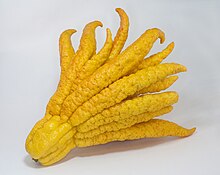Fingered citron
| Buddha's hand | |
|---|---|
 |
|
| Buddha's hand fruit, "open hand" appearance when ripe | |
| Scientific classification | |
| Kingdom: | Plantae |
| (unranked): | Angiosperms |
| (unranked): | Eudicots |
| (unranked): | Rosids |
| Order: | Sapindales |
| Family: | Rutaceae |
| Genus: | Citrus |
| Species: | C. medica |
| Variety: | C. medica var. sarcodactylis |
| Trinomial name | |
|
Citrus medica var. sarcodactylis |
|
Citrus medica var. sarcodactylis, or the fingered citron, is an unusually shaped citron variety whose fruit is segmented into finger-like sections, resembling a human hand. It is called Buddha's hand in Chinese (佛手柑), Japanese (仏手柑), and Korean (불수감).
The different cultivars and variations of this citron variety form a gradient from "open-hand" types with outward-splayed segments to "closed-hand" types, in which the fingers are kept together. There are also half-fingered fruits, in which the basal side is united and the apical side fingered. The origin of this kind of citron is commonly traced back to the Far East, probably northeastern India or China, where most domesticated citrus fruits originate.
Buddha's hand fruit is very fragrant and is used predominantly in China, Malaysia and Japan for perfuming rooms and personal items such as clothing.
The fruit may be given as a religious offering in Buddhist temples. According to tradition, Buddha prefers the "fingers" of the fruit to be in a position where they resemble a closed rather than open hand, as closed hands symbolize to Buddha the act of prayer. In China, the Buddha’s hand fruit is a symbol of happiness, longevity and good fortune. It is also a traditional temple offering and a New Year’s gift.
The fingered citron is cultivated as an ornamental tree in gardens and containers on patios and terraces.
Unlike other citrus fruits, most varieties of the Buddha's Hand fruit contain no pulp or juice. Though esteemed chiefly for its "exquisite form and aroma", the Buddha’s Hand fruit can also be eaten (often as a zest or flavouring) in desserts, savory dishes and alcoholic beverages (such as vodka) or candied as a sweet. The sliced, dried peel of immature fruits is also prescribed as a tonic in traditional medicine.
...
Wikipedia
